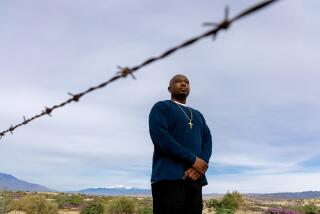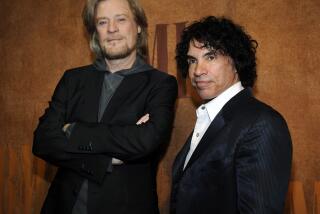Killer Denied New Trial, Sentenced to Life in Prison
- Share via
Twelve years after he was first incarcerated at Los Angeles County Jail for a slaying he now insists he did not commit, convicted murderer Harold Coleman Hall was sentenced Thursday to life in prison without the possibility of parole for the sexual assault and stabbing death of a young woman in South Los Angeles.
Ruling that he did not have the authority to order a new trial for Hall, Los Angeles Superior Court Judge Alexander Williams III pronounced the life sentence ordered by law for Hall’s conviction in the 1985 murder of Nola K. Duncan.
“I’m crushed,” attorney Karl Henry said moments after Hall, 30, stood impassively as the judge announced the sentence.
Before being led away, Hall said in a brief courtroom interview that he was not surprised by the ruling, particularly after so many years of legal proceedings that often have not gone in his favor.
“I don’t even have a reaction,” said Hall, whose appeals have drawn support from various church groups and community activists. “I just have to go through the appellate [process].”
Immediately after Williams’ ruling, Hall’s attorneys filed a notice of appeal on the grounds that the judge did not use the authority within his power to order a new trial for Hall.
Deputy Dist. Atty. David Demerjian expressed relief with the judge’s long-awaited decision. “I’m just glad it’s over,” the prosecutor said. “This guy deserves to spend the rest of his life in prison.”
In 1985, Hall was in County Jail after his arrest in Hollywood on suspicion of robbery and was preparing to enter a plea of no contest to that charge when Los Angeles police, acting on a jailhouse tip, questioned him about the slayings of Duncan, 35, and her brother, David Rainey, 26. The two were found dead--at separate locations--within hours of each other on the morning of June 27. Both had been stabbed to death, Rainey slumped in the driver’s seat of his convertible MG; his sister, dumped in an alley.
During an interrogation that spanned hours, Hall not only confessed to those murders but to complicity in an October 1984 gang shooting that took five lives and came to be known as the 54th Street Massacre. (Prosecutors eventually dismissed charges against Hall in the case after he testified for the prosecution.)
Authorities have long contended that Hall spoke with authority about the Duncan/Rainey killings because he was clearly involved in them. And, they said, a jury not only heard evidence that Hall confessed to police but that he also exchanged notes about the murders with a jailhouse informant.
But Hall and his attorneys have argued that he only “confessed” to detectives as a statement of convenience, cooperating because he was exhausted by the questioning and also hoping to build a relationship to protect him and his family after he testified for the prosecution in the 54th Street shooting.
And, they said, the police informant at County Jail subsequently admitted that he altered some sections of the notes from Hall before turning them over to authorities.
Nevertheless, Hall was convicted by a jury in 1992 of the murders of Duncan and her brother. In 1994, an appeals court reversed Hall’s conviction in the slaying of Rainey, ruling there was insufficient evidence to tie him to that killing. Since that ruling, Hall’s attorneys have tried to win a new trial for him in the slaying of Duncan.
During Thursday’s hearing, however, Judge Williams concluded that while the appeal court sent the Duncan case back to him for sentencing, it did not give him authority to consider ordering a new trial for Hall.
More to Read
Sign up for Essential California
The most important California stories and recommendations in your inbox every morning.
You may occasionally receive promotional content from the Los Angeles Times.










